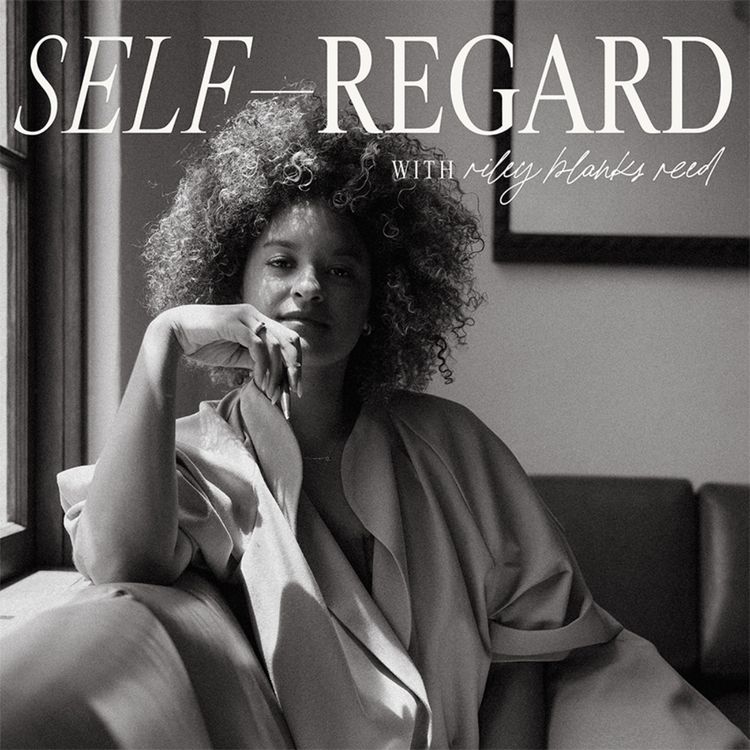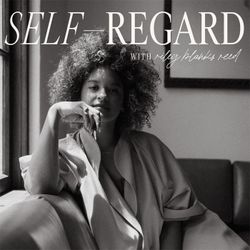Share

Self-Regard
Jules Acree – Living Intentionally
Jules Acree is a wellness writer, content creator, and certified yoga + mindfulness teacher. Her daily mission is to bring wellness down-to-earth and to help others simplify life to find more joy in this digital age. Through her journey, she’s learned it’s about the small shifts made consistently that add up to sustained change. She aids her readers and watchers with finding more ease and ditching the all-or-nothing mindset through incredible content that incentivizes you to live a more intentional lifestyle - one that motivates you to slow down, cut the clutter and tune into your own channel.
Mental health – 10:42
Mindfulness – 17:15
Morning routine – 19:38
Evening routine – 23:52
Social media process – 27:49
Home organization – 32:35
Launching your brand – 44:28
Family and Culture: 48:44
Her go to book: Essentialism by Greg McKeown
Follow @wokebeauty @rileyblanks @omandthecity
Check out Jules' blog: www.omandthecity.com and her online store: www.thehomebodies.co
Learn more at www.wokebeauty.com
More episodes
View all episodes

Archives 2: Reshaping Narratives with Torri Yates-Orr, Jane Hervey, and Shauntavia Ward
41:35|In this episode, we uncover conversations from the archives with Torri Yates-Orr, emmy nominated historian and storyteller; Jane Hervey, creative director, recording artist, and the founder of Future Front Texas; and Shauntavia Ward, the founder of eleMINT. You'll learn how to combat shame, the real story of Cleopatra, why cellulite is sexy, how to move through difficult relational dynamics, what practicing antiracism actually looks like, and why the beauty industry needs an overhaul. They all share their insights on how reframing and reaffirming culture can help celebrate history and promote social justice in storytelling and advocacy. We also discuss the importance of redefining holistic wellness in the context of identity, and how these concepts intersect with broader conversations around culture and representation.
Archives 1: Transformative Insights from Alex Elle, Arielle Estoria, and Leah Thomas
33:55|A fresh series featuring interviews from the archives. The conversations have been condensed and arranged to highlight especially notable themes such as creative writing, resilience, motherhood, environmentalism, and social justice. You will hear from Alex Elle, Arielle Estoria, and Leah Thomas – writers, artists, and advocates – who share their wisdom on a range of topics that explore the transformative power of storytelling for personal growth, community care, and social change. Through their inspiring stories and insights, Alex, Arielle, and Leah remind us of the importance of self-reflection, self-care, and self-expression. They invite us to be curious, compassionate, and creative in our own lives, and to use our voices to make a positive impact in the world. Join us for a journey of self-discovery and inspiration with these three remarkable individuals.
Reflections 7: Finding a Place for Your Creative Self
08:15|In the first episode of this series, I discussed the importance of solitude. This episode represents a key ingredient to getting the most out of time spent alone: creativity. And yet, as we pursue our creative passions–whether personally or professionally–it's important to avoid getting consumed by them and losing ourselves in the process. I share my personal journey of using storytelling to drive social change and how I found a home within myself through creativity. Despite doubts about the industry being saturated and lacking uniqueness, we all possess unique intricacies that can be expressed through art. Through self-regard and balancing our individuality with the well-being of others, we can use creativity to expand ourselves and our collective.
Reflections 6: The Balancing Act of Being Both Black and Biracial
12:18|In this episode, I discuss my experiences with racial bias and colorism as a Black and biracial woman, as well as my feelings of not belonging and the paradoxes of my identity. The privilege of dancing cross-culturally requires a rare skill to adapt.
Reflections 5: The Paradox of Labels: Empowerment or Limitation?
11:48|This episode explores the power and pitfalls of labels in defining our identity. While labels can help us understand ourselves and connect with others, they can also reinforce biases and perpetuate harmful stereotypes. It's important to use labels as a starting point for self-exploration and personal growth, recognizing that our identities are fluid and constantly evolving. Labels are a powerful tool for personal and societal growth, allowing us to find a sense of belonging while also challenging systemic injustices. By expanding our understanding of different labels and identities, we can create a more inclusive and empathetic society. But we must use labels thoughtfully, acknowledging their potential for both clarity and division, and not allowing them to limit or define us in overly simplistic ways.Follow @rileyblanksreed for more.
Reflections 4: Identity in Physical Form
07:54|The complexities of body image and identity run deep. I have always had a pull towards body neutrality; focusing on celebrating and appreciating my body for what it can do, apart from its appearance. This is a tricky practice. It's hard not to care about the way my body looks. I'm not sure I ever won't. But the language I attach to thinking about my body has proven to be incredibly important. It starts with observation, acceptance, and compassion for every part of Self.Resources: Claire Siegel of Flourish, No Bad Parts by Richard Schwartz and When Things Fall Apart by Pema Chodron
Reflections 3: Intentional Love; The Intersection of Connection and Individuality
14:16|Welcome to Part 2 of Reflections. In this episode, I expand on the definition of love as an active word; a verb that isn't solely about attraction or compatibility, but moreover: effort, intention, and understanding. While this episode is relevant to all relationships – friendships, familial ties, romantic flames, and platonic connections – I largely use my 13 year long relationship as my lens. One of the biggest lessons I've learned is that there has to be a balance between individualism and connection, an element of reciprocity and mutual appreciation, and giving and receiving graciously.A few key takeaways:Life's challenges don't always have to be fixed, and planned visions are not certain.Love is not determined by personalities, but by creating a fascinating harmony that keeps bonds in tact while fortifying your individual selves.Other people's behavior towards you is not a reflection of your own worth. Instead, it is a reflection of their relationship with themselves.Love requires a balance between separateness and togetherness. Commitments are voluntary agreements, while attachments are attempts at control.Communication is important, but comprehension is key. Ensure that the other person truly understands you.Cultivate fascination and curiosity in your relationships to keep them alive and interesting.Spend time alone to know yourself better and to therefore be more present in your relationships and your communities.Ask yourself: "does this person make me happy?"
Reflections 2: Grieving the Loss of My Faithful Shadow
10:49|I lost my dog baby, George, suddenly; and I am devastated. Everything feels unfamiliar without him. As his primary caregiver, he offered me pure, unconditional love and unselfish devotion. This part of the series was intended to cover the importance of relationships in our identity and livelihood. It felt relevant to share this grief because the loss of George – the loss of a relationship – has challenged my home life and compelled me to wonder who I am without him following me into every room. My partner and I haven't experienced this kind of rupture in our environment. It has challenged us to grow and support one another in newfound ways. This loss looks like heartbreak and emptiness. But, within any container is an opportunity to expand. I know there are ways George will remain with us, even if not in physical form. And we will get to that evolution of the grieving process together. “Form is emptiness, emptiness also is form. Emptiness is no other than form, form is no other than emptiness. Form is that which simply is before we project our beliefs onto it. ‘Form is emptiness’ refers to our simple, direct relationship with the immediacy of the experience. First we wipe away our preconceptions and then we even have to let go of our belief that we should look at things without preconceptions. In continuing to pull out our own rug, we understand the perfection of things just as they are. But ‘emptiness also is form’ turns the table. Emptiness continually manifests as war and peace, as grief, birth, old age, sickness, and death, as well as joy. We are challenged to stay in touch with the heart-throbbing quality of being alive. That's why we train in the relative practices of limitlessness and tonglen. They help us to engage fully in the vividness of life with an open, unclouded mind. Things are as bad and as good as they seem. There's no need to add anything extra." –Pema Chodron
Reflections 1: The Innate Pleasure in Solitude
17:50|There is a deep connection between solitude and self-regard. When they are in harmony, we can collectively lead more fulfilled lives. In this first episode of the series on Reflections, Riley ponders the peace and quiet that solitude brings and how it allows us to elevate our identities to a place of contentment. Sharing her personal experiences, she discusses the difference between the ego and the self and the importance of having a healthy self-regard.Riley also introduces a core pillar of this show: identity; unraveling how sports and life events have influenced her sense of self and how she has navigated changes and loss in her life. The healing power of self-expression is emphasized but not without acknowledgment of the harm that can come from commodifying trauma.Solitude is an important aspect of our lives. It does not have to conjure up loneliness but rather, can facilitate a space in healing, growing, and loving alone time. After all, it provides us with wide open space and blank canvas to connect with ourselves and explore our thoughts and feelings. Whether it's in front of grandiose mountains or sitting against a tree, there is solace and peace to be discovered in solitude.Listen further for resources and tactics for finding comfort in times of aloneness.“The more you lose yourself in something bigger than yourself, the more energy you will have.”"You are not the voice of the mind–you are the one who hears it. There are two distinct aspects of your inner being. The first is you, the awareness, the witness, the center of your willful intentions; and the other is that which you watch. The problem is, the part that you watch never shuts up. If you could get rid of that part, even for a moment, the peace and serenity would be the nicest vacation you’ve ever had.”"The will to extend one’s self for the purpose of nurturing one’s own or another’s spiritual growth. Love is as love does. Love is an act of will–namely both an intention and an action. Will also implies choice. We do not have to love. We choose to love.”“Care is a dimension of love, but simply giving care does not mean we are loving.”"We need to look at things deeply in order to understand their own true nature, so that we will not be misled into suffering and bad feelings.”